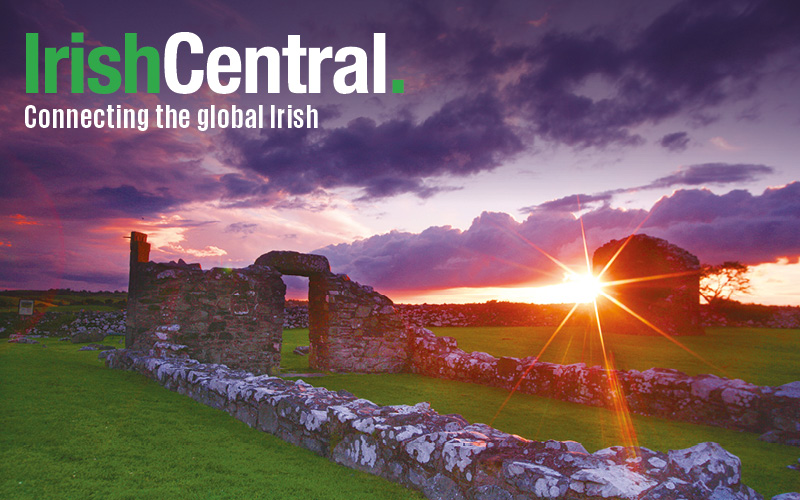| Sean MacConnell, RIP, passed away suddenly after a local seisuin |
A rattling mighty summer ended last week. It was lifted by more family celebrations and craic than ever before and, in all fairness, despite any hangovers or fatigue, I faithfully reported my meanderings to you.
September slid into being on a golden saucer of sunlight and whispering yellowing leaves and serenity and it was good. I had a lighthearted piece for ye in my head last Monday, ripening for delivery to Debbie and Caty on Thursday, and do ye know what it was? It was dealing with the fact that I was unable to keep my promise to go to Purgatory because, when I applied in mid-August, I was told the pilgrimage season to the fabled Saint Patrick’s Purgatory, on Lough Derg in Donegal, had officially ended on August 12th.
I was going to wryly inform you all that I was deeply sorry to be unable to subject myself to three days and nights of barefoot penitence and fasting and pain until next year. It would have been a lighthearted read that some of you at least would have chuckled at and I would have enjoyed writing. But I landed in Purgatory anyway.
The phone rang at the crack of dawn on the Wednesday with the dreadful news that my beloved younger brother Sean had died suddenly at his home in Dublin a few hours earlier. Since then the whole clan know what Purgatory burns like. Quite dreadful. Worse than Lough Derg.
The facts are that he had hugely enjoyed his weekly folk music session on the Tuesday night in the local Saint John's GAA Club five-minutes walk from home. The last song he sang in the session was younger brother Mickie's celebrated “Only Our Rivers Run Free”. He sang it very well I was told. He walked home, went to bed, and was stricken with what was apparently a massive heart attack at about 2.30am. Incredibly enough the last words he said to his wife Patricia were a whispered "D.N.R !" I had not heard that amalgam before but I now know that it means "Do Not Resuscitate!" It had apparently been one of his mantras since he retired last year, in splendid health, from The Irish Times.
He was dead in seconds, long before the ambulance arrived. It was clearly what he would have wished rather than for a long vegetative lingering. He was just sixty six.
Now one of my lovely fathers in this writing trade was the great Valentia Island journalist Liam MacGabhann. I worked with Liam in a magazine in my twenties and learned a lot from him. One of his views was that no Irishman, no matter how high and mighty, was entitled to much more than 300 well-chosen words for his obituary. I have heeded that since.
Dramatically, when Liam himself passed away ten years later, I had a column in The Irish Press and it fell to me to write his obituary. The column had an allocated space for 1200 words. I wrote 300 words exactly about my friend and sensitive sub-editors in Burgh Quay left the rest of the space whitely blank, inch after single column inch.
It was perhaps the most powerful piece I've ever produced in terms of impact. Accordingly I am not going to write another word about my dear brother Sean. Laterally though, from the depths of Purgatory, for families who are also arriving there, can I strongly commend the healing qualities of the ancient rituals of an Irish wake. If there is the body of a loved one to be mourned it is infinitely preferable, if possible, for there to be a wake at home rather than in the antisepticated surrounds of a funeral parlor.
And if there is a note of a song or any bit of music at all in the affected clan then it should be delivered for as long as possible to ease the edge of those first hurting hours. And it does great good all round.
And a few drinks along with the songs and reels and jigs are also appropriate. And menfolk should not try to hold back the tears whose falling is so freeing for the womenfolk. And at the funeral itself, in the colder light of day, especially in a Catholic chapel, slow Irish airs on flutes and violins and tin-whistles especially, in some kind of Celtic audio alchemy, seem to shorten the edges of infinity between where we are and Paradise.
And, after the cemetery or cremation, at the routine reception for family and friends and neighbors, it is holistically therapeutic if the Irish wake continues until nightfall with music and song, especially the favorite musics and songs of the spirit that has moved to another dimension entirely. Take my word for it. There is something else.
If the bereaved family have any connection with the mighty GAA subculture, which is a way of life and living rather than just two brilliant ball codes, then the wake will be hugely enhanced by being held in the nearest GAA clubhouse like Saint John's in Rathfarnham, Dublin. There will be genuine grief and compassion shown to the family by men and women who were strangers to them moments before. There will be warmth and caring and sharing. There will be many to play and sing. And the sense of a good team member lost even as the big game of Life goes on. And, from Purgatory, that is quite enough for now.




Comments